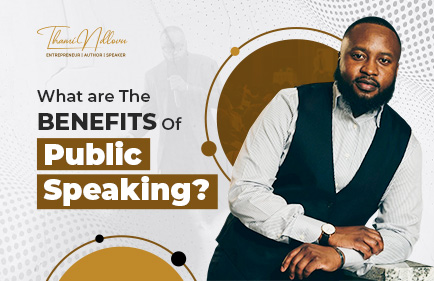Amid today’s turmoil, people need motivation and guidance more than ever. Motivational speakers play a critical role in this scenario. They motivate people to overcome adversity, adapt to change, and work towards personal and business development.
A motivational speaker is an individual who gives speeches designed to rejuvenate and inspire others. Based on personal experience, knowledge, or unique viewpoints, motivational speakers attempt to bring about positive change, boost morale, and build resilience in listeners. Their speeches may occur in various settings such as corporate functions, schools, conferences, and the Internet.
If you have a fantastic story, a compassionate heart to assist others and a desire to make a difference, a career as a motivational speaker is waiting for you.
So, how do you become a motivational speaker? This blog provides a step-by-step guide to achieving a prosperous professional life.
What is a Motivational Speaker?
A motivational speaker is an effective communicator who uses words to inspire, motivate, and empower their audience. They come onto the stage not to impart knowledge but to touch hearts and minds. These professionals challenge people to rethink their outlook, initiate change processes, and improve their careers and lives.
The greatest strength of motivational speakers is their ability to develop strong connections with their audience through authenticity and good narration. They will likely utilize survival stories, narrating tales of hardship, success, and personal transformation, to deliver a message touching the innermost part of the human soul.
Whether breaking barriers, establishing confidence, pursuing good leadership, or navigating change, their stories are designed to foster such growth, even in the face of adversity.
In addition to their personal experiences, motivational speakers use insights from psychology, leadership, performance science, and their respective areas of expertise. They reinterpret these subjects carefully to address their respective contexts and the public.
A motivational speech’s tone can vary, ranging from high-key and high-energy to emotional and contemplative. But what is always there is its strong emotional bond with its listeners.
Motivational speakers work with all kinds of individuals and industries. In the corporate setting, they help companies create morale, embrace a growth mindset, and manage organizational change. In schools, they inspire students by giving speeches on perseverance, goal setting, and self-esteem.
Motivational speakers help people recall their dreams and rekindle the spark in their lives at seminars, retreats, and self-improvement workshops. With the advent of online events and the internet, thousands of people can now reach global audiences through webinars, social media clips, podcasts, and online courses.
Finally, motivational speakers are the true transformation agents. Their power comes not from what they do or say but from how they make others feel confident. They promote something inside the audience and proceed with a new action.
Difference between a Motivational Speaker and a Keynote Speaker
While motivational speakers and keynoters share the same platform in front of the same audience, their purpose, function, and approach differ significantly. Knowing these differences is worthwhile, especially if you hope to build a career in speaking and want to position yourself for success.
The end goal of a motivational speaker is to motivate, energize, and enlighten the audience. Their message is emotional and personal, taken from their life, struggle stories, and lessons learned through personal or professional transformation.
The end objective is to create a real connection with the audience, motivate them, give them hope, and enable them to control their lives. Motivational speakers are regularly called upon to speak at schools, corporate wellness programs, leadership conferences, and self-help seminars. The intention in such settings is to create an emotional connection and encourage a shift in attitude.
On the other hand, a motivational keynote speaker is often the headliner or feature of an event, chosen with a strategy to discuss the theme or mission of the day and the pertinent industry issue. While there can be motivational elements to a keynote address, the motivation and content will often be specific to the audience’s particular needs.
At a technology conference, a keynote address can emphasize the innovations of tomorrow, offer leadership perspectives, or present interesting business models. They may sometimes include the added interest of an interesting personal anecdote but are always rooted in the underlying theme of the event.
Keynote speakers tend to be established professionals in their field of expertise, thought leaders, published authors, or veteran executives. They are invited to open or close a conference with significant implications and importance.
Motivational speakers are interested in creating emotional bonds and promoting self-change and prefer to speak openly in a way that invites change. Keynote speakers, on the other hand, are more interested in offering high-level insights and aligning with the strategic aims of an event. This is all while they can also inspire their audience with the strength of their presentation.
Most professional speakers use various methods, responding to the circumstances, audience, and desired effect. However, knowing the difference will assist you in preparing your content, expressing your stance, and delivering customer satisfaction with your presentation.
Who Needs Motivation Today And Why It Matters?
In today’s world of relentless change, technological disruption, market volatility, and rising mental health issues, the need for motivation has never been greater.
From the people wrestling with their issues to the corporations with turnover and burnout, people at all levels are searching for clarity, motivation, and the guts to move forward. It is where motivational speakers shine and are of invaluable value.
- Children, for example, are often burdened with school stresses, social anxiety, and an unsettling lack of direction about the future. A motivational speaker can teach them to build resilience, believe in themselves and their capabilities, and approach their studies and life decisions with a fresh sense of purpose and direction.
- Working professionals, with their newly acquired or veteran leadership roles, will likely become burned out, disengaged, or disconnected from their mission. A motivational speech can reinvigorate their passion, awaken a sense of mission, and remind them of the reasons they originally entered their professional lives.
- Entrepreneurs and business people face high-stress levels with little help from the external environment.
In such cases, they can significantly benefit from motivation that reminds them of their purpose. Motivation also provides coping mechanisms to deal with the inevitable failures of entrepreneurship. The motivational lessons of one who has walked the same path can be the difference between quitting and succeeding.
- Business organizations offer themselves as target audiences par excellence. In a business culture in which innovation, employee welfare, and motivation are linked to success, motivational speakers are necessary. They bring teams together, improve morale, and ignite a shared vision.
Their presentations enhance communication, leadership, and cooperation among organizations, which has a long-term effect on company outcomes and culture.
Here’s further information on how to become a motivational speaker.
Take note that the career path goes beyond conveying a positive message. It involves delivering useful tools, emotional encouragement, and the critical mental adjustment necessary for change to endure.
Fundamentally, it calls people to remember that they can accomplish more. Regardless of circumstances or timing, growth and achievement are always within reach.
In a time when millions are lost, not motivated or directed on what the future holds, the need for motivation has shifted from being a supplement to a necessity.
Thus, motivational speakers emerge as the dominant players, determinedly and with vision, leading people and organizations through the twists and turns of a changing world.
Step-by-Step Guide to Become a Motivational Speaker
To be a successful motivational speaker, one must have more than charm and passion. It also requires clarity, skill acquisition, strategic branding, and a tenacious commitment to work.
You are about to discover a comprehensive and detailed step-by-step guide to help you get started and create a career as a professional speaker. How to become a motivational speaker, you asked? Get your pen and paper ready.
1. Finding Your Purpose and Message
Every great master motivational speaker begins with a solid “why.” Step one is finding your core message — that special personal insight or life takeaway that makes you different.
Sit down for a minute and think about the personal experiences, changes, or setbacks you’ve encountered that have influenced your perspective. Frequently, these experiences contain insightful lessons from which other people can learn.
After you have your message, you need to determine your audience. Consider who would benefit most from your message—students, businesspeople, entrepreneurs, or maybe some niche subgroup such as athletes or caregivers. Having your message and your audience in hand constructs the foundations for a genuine and fruitful conversation.
- Underline your Objective: Underline your core message according to life lessons and personal experiences.
- Identify the Target Audience: Highlight the target audience that would suit your message.
- Introduce a Thriving Foundation: Accomplish a foundation for accurate and impactful communication.
2. Build Your Skills and Expertise
Good speaking is speaking well about telling a story and how you talk. To be a good speaker, you must continually hone your speaking skills. Look for credible organizations where you practice speaking in public frequently and get constructive criticism. They will assist you in building your confidence in a secure setting.
Also, become a storyteller. Master the art of storytelling to move hearts, stir emotions, and captivate the audience. Exceptional motivational speakers walk the tightrope between vulnerability and resilience and emotion and simplicity.
Receive constructive feedback from peers, mentors, and audiences to refine your message, tone, and delivery. Practice and self-reflection are the keys to becoming a dynamic, confident speaker.
- Engage in Routine Practice: Exercise public speaking and pursue constructive feedback.
- Learn Storytelling: Ace the art of storytelling to achieve an emotional connection with your audience.
- Fine Tune the Delivery: Always improve your delivery through mentoring and self-reflection.
3. Create and Refine Your Content
Your signature speech is your calling card—how people and event planners will get to know you. Begin by developing a solidly structured speech with a clear beginning, middle, and end.
Your beginning should grab your audience immediately. Your middle should deliver your core messages through powerful stories. And your ending should motivate and energize people to act.
To infuse a personal flavor into your content, spin in some real stories and anecdotes that evoke an emotional connection. Attempt to give tangible, actionable learning so that your message is motivational and has a purpose.
Keep testing and refining your content based on the feedback you receive from your audience. This will help you discover that lovely rhythm that resonates with your mission and voice.
- Structure your Content: Shape your unique speech with a gripping beginning, message-rich middle, and rousing end.
- Use Realistic References: Pick real-life tales to conjure emotions and convey actionable insights.
- Update your Material: Review content based on audience feedback for perfection regularly.
4. Build a Personal Brand That Inspires
Your brand is your reputation as a speaker. It tells the world who you are and how they should see you.
Thus, it must always reflect your message, values, and expertise. Begin with a business website that presents your speaker bio, what you talk about, testimonials, a demo video, and your contact info. This will be your event planner’s resume online.
Ensure your branding is consistent across all social networking sites, with consistent visuals, a single voice, and a single message. Share regularly content that demonstrates your expertise. Moreover, it allows you to interact with your audience through motivational videos, behind-the-scenes media, personal stories, or pieces regarding thought leadership.
- Install an Authentic Brand: A dynamic and appealing personal brand that shows visibility and credibility in the industry.
- Be Consistent Throughout: Build a consistent personal product that echoes your values and message.
- Achieve Universal Tonality: Keep cohesive voice and visuals across all social media channels.
5. Establish Your Online and Media Presence
Today, the most incredible motivational speakers tap into the potential of online media to extend beyond the limits of live stages.
Go where the audience is. For instance, LinkedIn is for working professional adults, Instagram is for health and wellness optimists, and YouTube is for compelling visual storytelling. Connect with your audience via live video, live comment streams, and storytelling posts.
Leverage podcasts, interviews, webinars, and panel conversations to reach more and demonstrate your expertise. Digitization expands your audience and facilitates it so planners and decision-makers can find and book you.
- Network through Social Media: tap into social media platforms such as LinkedIn, Instagram, and YouTube to reach targeted audiences.
- Generate Audience Engagement: Interact with your followers through live videos, collaborating posts, and storytelling.
- Push for Visibility: Grow your visibility by partaking in interviews, podcasts, webinars, and panels.
6. Marketing and Monetization Strategies
To make your passion for public speaking a profitable venture, you require clever marketing strategies and multiple sources of income. In addition to talking live, consider providing other services, such as workshops, company training, or individual coaching, that complement your field of specialty.
You may also diversify your income streams by writing a book or eBook, creating online courses, or doing webinars. These products allow you to earn passive income while sharing your message with more people.
To establish your speaking business, create a marketing plan, establish your target client, and determine your competitive service fees. Invest in tools or partners who can help you reach more people.
- Introduce Parallel Income Streams: Branch out your income mediums through coaching, workshops, books, and online courses.
- Use Effective Marketing Tactic: Generate a comprehensive marketing strategy with a distinct audience and pricing structure.
- Use Inventive Tools: Take the help of dynamic partnerships and tools to improve reach and professionalism.
7. Networking and Relationship Building
Succeeding in motivational speaking can ultimately be as much a matter of who you know as what you know. Make networking a priority by attending speaking conferences, leadership camps, and professional conventions.
These gatherings create sparks and offer excellent networking opportunities with event planners, mentors, and other speakers.
Get involved in speaker groups, mastermind sessions, or online communities where idea exchange is common and trends are easily accessed.
Forming genuine relationships gives you access to referrals, joint business opportunities, and repeat bookings. These are the building blocks of a successful speaking career.
- Invest in Marketing: Participate in industry events to set up connections with mentors, planners, and fellow speakers.
- Collaborate with Peers: Become part of speaker communities and brainstorm groups for knowledge exchange.
- Leverage Existing Bonds: Tap into existing industry connections to avail referrals and collaborative opportunities.
8. Continuous Improvement and Long-Term Growth
The best motivational speakers are continuous learners. Request feedback after every session to understand what worked for your audience. Use that information to improve your message and presentation.
To stay updated with changing trends in your field, your audience’s tastes, and communication art, read extensively, attend workshops, and take motivational speaker courses. To establish credibility, you may also become a certified coach or speaker.
Adopting lifelong learning ensures your content is up-to-date, relevant, and effective in the long term. It will also contribute to developing and growing your skills as a speaker in the future.
- Incorporate Client Criticism: Look for genuine feedback after every speech to improve future performances.
- Remain Up-To-Date: Stay in the know by reading, taking courses, and getting certifications in speaking.
- Continue Developing Your Speaking Style: Uninterruptedly honing your skills to evolve and sustain your speaking career.
Grow Your Business with Thami Ndlovu’s Expertise
Many wonder how to become motivational speakers. Keep in mind that all great speakers started somewhere. Your path begins with that first step.
Building a career as a motivational speaker requires passion, dedication, and preparation. You can inspire others and leave an indelible mark by developing your message, sharpening your skills, and establishing a strong personal brand.
Are you ready for your first step or to take your speaking career to incredible new heights?
Contact Thami Ndlovu for one-on-one motivational speaking classes, branding strategy, and professional coaching.
Should you want to craft your signature talk, build your online presence, or land decisive speaking engagements, his motivational speaker training can guide you. All services and courses from Thami Ndlovu are designed to help you understand the benefits of public speaking. They will make you shine, leave an indelible mark, and thrive.
Start your transformation today with the ace business growth consultant Thami Ndlovu. Empower the world with your voice.


